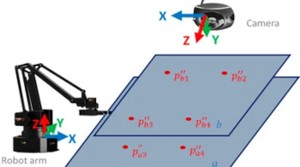Will A Robot Be Your Next Acupuncturist? Artificial Intelligence in TCM

The short answer is no..., but, the longer answer is maybe... and soon. There are a host of opportunities in the field of Chinese Medicine for the use of artificial intelligence and machine learning. Robots delivering acupuncture (which is happening) is probably not the best use of these approaches in my opinion. But the same machine learning techniques that are currently being developed en masse in western medicine, have very valid potential in avenues such as large scale point combinations to pattern/result analyses and a whole range of herbal analyses.
I'm going to cover some of these potential usages over the next series of articles. Why?, well for that I'll let Dr. Muhammad Mamdani, vice-president of data science and advanced analytics at Unity Health in Toronto answer. Dr. Mamdani stated in a CBC article entitled "Learn AI now or risk losing your job" that in his hospital they have a saying... "AI is not going to replace clinicians, but clinicians who use AI are going to replace clinicians who don't use AI"
Now robot guided heart surgery, for example, is at first glance quite a bit different from the application of acupuncture, but how different? Either way practitioners are involved. The commonalities are in two places. On the research/clinical decisioning side (ie exactly what to do and why) and then the application side (ie the "how"). In the first place, with the right data sets, is where ai/ml really shines for now. The second place, the "how", is probably not as appropriate/possible, except when you think about it from a research perspective. That is, providing for the complete removal of the clinician from the arguably dynamic application of acupuncture.
This has obvious value in a research setting where we only want to see if "x" protocol for "y" condition/pattern leads to a result. We don't want to know, in most studies, if a "nice" acupuncturist gets better results than an "indifferent" one - but that is a valid avenue of research as well. And... spoiler, at least from western studies with sugar pills, a "nice" acupuncturist will get better results. But to stay on track with the AI discussion, it is worth noting as reported in this preprint study that people were more 9.8 times more likely to see a response that came from a chatbot about their medical issues as "empathetic" versus when an actual physician responded.
Publishing in the "International Journal For Numerical Methods in Biomedical Engineering" a team of researchers from Guilin University, China, used machine learning techniques to improve the point location and needling depth accuracy of an acupuncture "robot" to 90.12% (study). And in a 2019 study, researchers from the Medical University of Graz, Austria, noted in their paper "Robot-Controlled Acupuncture - An Innovative Step towards Modernization of the Ancient Traditional Medical Treatment Method" that "RCA [robot controlled acupuncture] has become a reality and is no longer a distant vision" (study).
Along those lines, in early 2022, researchers from the Nanjing University of Chinese Medicine noted that due to the rapid advances in the field of artificial intelligence that there is an "important opportunity" for the internationalization of acupuncture and moxibustion (study). This being due to the way that intelligent medical equipment and modern controls/data utilization can be applied to the techniques.
Whether or not you think this is viable, a good or a bad thing, it doesn't change what is happening to medicine and will be coming for aspects of Chinese Medicine. Over the course of about 5 hours I was recently able to build a Chinese Medicine chat bot using some of the freely available large language models. After feeding it a handful of textbooks, I could ask it fairly specific questions such as "what is meant by blood deficiency in comparison to what it means in western medicine" and "what points would be good for spleen qi deficiency". I was literally amazed by the answers...
I'm not sure what any of this means for our field, but I can see very valid use cases for these techniques on the herbal side certainly and, again with proper data sets, on the acupuncture application side. Imagine feeding this system patient treatment notes from a thousand practitioners and allowing it to look for the most efficient routes of treatments under a certain set of conditions. At the very, very least it would provide for some extra thinking points and ways to grow as a practitioner - not least of which since so many are working in situations of limited exposure to their colleagues techniques, results and feedback.
I'm looking forward to exploring all of this over the next handful of articles as well as, eventually, releasing on the yin yang house website, my preliminary work on a TCM chatbot. Curious, a little scared, and mostly just a bit in awe at what this may all bring...
(image edited from original within this study)
tag @yinyanghouse for questions/comments
Comment by Archived User
in addition to needle pricking, which changes certain vibrations in the body, other aspects must be present - such as compassion, experience, love. if we read about the study of the heart institute, everything will become clear.